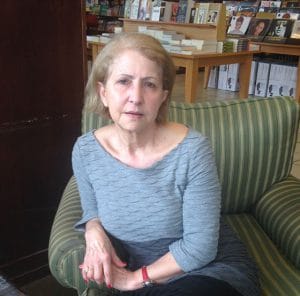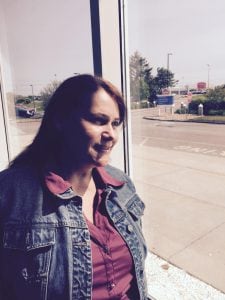Gratitude for surviving cancer

Edna Mendonça
Edna Mendonça still cries when she talks about her diagnosis of breast cancer, although she no longer has the disease.
“But today it’s a cry of gratitude,” she said as she searched her bag for a tissue.
She recalled the day she felt a lump in her left breast. She was 54 years old. A few weeks later a biopsy confirmed the suspicion, only days shy of Thanksgiving in 2004.
“No matter the stage of the disease, the scare is the same,” she said.
“Cancer is a devastating diagnosis, said David Lovett, MD, medical director of the Davenport-Mugar Cancer Center at Cape Cod Hospital.
Mendonça went through 35 sessions of radiation therapy at Cape Cod Hospital, but did not need chemotherapy. Originally from Brazil, she said she was very moved by the compassion she received from doctors and nurses and staff in general at Cape Cod Hospital.
”This country has given me so much. I say a ‘thank you, God’ every day.”
The Davenport-Mugar Cancer Center at Cape Cod Hospital sees about 25 new patients and from 200 to 250 patient follow-ups per week.
The Center treats most types of cancer, and works closely with Dana-Farber Cancer Institute in Boston for referrals for patients with rare cancers that need more specialized treatment.
Another cancer patient at the Center, Lindamira Deus of Falmouth, felt such a bond with other cancer patients that, she wore a hat in the treatment room – even though she did not lose her hair during chemotherapy “I did it in solidarity to patients who lost their hair,” she said.
Deus was diagnosed with colon cancer in November 2012 and was determined to stay upbeat through her treatment.
“Cancer likes sadness, if you let it too much in, the disease takes over,” she said.
After six months of chemotherapy, Deus now has a CT scan every six months, followed by a visit with her oncologist at Cape Cod Hospital, Phillip Wade, MD. She also relies on a routine of daily prayers.
The Importance of Family and Friends

Lindamira Deus
Deus recalls with gratitude the support she received from friends and family. One friend brings her fruits, even now that the treatment is over. Her son-in-law does not leave the house without asking if she needs anything.
“We see a better outcome with patients who have a close support system: lots of friends, church support, family, of course,” said Dr. Lovett. “An important thing is being there, understanding. Not to go out of your way with attention. Get cues from the patient. It is important (for patients) to know that people have their back. ”
Jeffrey Gaudet, a social worker and survivorship program manager at Cape Cod Hospital works together with Carole Bernier and Karin White, also social workers, to provide support and information. “We are here to offer hands-on help to patients and family members.”
The social workers provide a list of a variety of support groups to patients and their families. “The support groups offer an opportunity for people to share ideas and to get support from each other through happy and tough times,” said Gaudet.
Nurses are also an important part of patient care at Davenport-Mugar Cancer Center. Afraid of needles, Deus said she will never forget the day Emily Gomes, RN, an oncology nurse for 15 years, told her The Princess and the Pea tale, in order to calm her down while she started an intravenous line.
“I was trying to tell her that she was a real princess, since she was able to feel pain,” said Gomes.
Gomes likes to remind patients and families that it is important to ask questions.
“We are never too busy to answer a question. We want to give every tool (for patients) to get through this difficult times,” she said.
For Mendonça, moments of fear still arise. Recently she felt a lump in her left armpit and went to see her oncologist, Jaclyn Flanigan, MD.
“She was so truthful with me. She went down the list of high risk factors and assured me I did not meet the criteria and that ‘if anything changes, I’ll send you straight to mammogram.’” Mendonça said she left the office feeling relieved.
Gomes said her patients have taught her many things over the years.
“People have taught me so much about how to live and how to die with dignity.”
